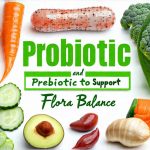The intricate ecosystem within our digestive system, commonly known as gut flora (or microbiome), profoundly impacts not just digestion but also immunity, mental wellbeing, and overall health. For years, probiotic supplements have been marketed as the key to a healthy gut, leading many to believe they are the only way to cultivate beneficial bacteria. However, a robust and diverse gut microbiome isn’t solely reliant on introducing external bacterial strains; it thrives on nourishing the good bacteria already present within us, along with encouraging their proliferation. This can be achieved through targeted dietary and lifestyle choices that effectively ‘feed’ the existing microbial community without necessarily needing to ingest billions of CFUs in pill form.
The emphasis should shift from solely adding probiotics to prioritizing prebiotics, symbiotic relationships with food, and cultivating a gut environment where beneficial bacteria flourish naturally. While probiotic supplements can be helpful for specific conditions under professional guidance, they are not always necessary or sufficient for maintaining long-term gut health. A holistic approach focusing on dietary fiber, fermented foods (naturally occurring sources of probiotics, but different from pills), stress management, and mindful lifestyle choices offers a more sustainable and effective path to a thriving microbiome – one that’s deeply personalized to your unique needs. Understanding your gut requires tests that support long-term resilience.
Dietary Foundations for Gut Health
The foundation of any gut health strategy lies in what we eat. A diet rich in diverse plant-based foods provides the necessary fuel for beneficial bacteria, while limiting processed foods, excessive sugar, and unhealthy fats minimizes disruption. Focusing on whole, unprocessed foods isn’t just about avoiding bad things; it’s about actively nourishing the good ones. It’s also important to remember that everyone is different, and what works well for one person might not work for another. Paying attention to how your body responds to various foods is crucial for personalized gut health support.
Prebiotics are essentially food for probiotics – non-digestible fibers that pass through the upper digestive tract intact and arrive in the colon where they become a feast for beneficial bacteria. Incorporating prebiotic-rich foods into your diet can dramatically improve microbial diversity and activity. Some excellent sources include:
– Garlic
– Onions
– Leeks
– Asparagus
– Bananas (especially slightly green ones)
– Oats
– Apples
Fiber, in general, plays a pivotal role. Aim for at least 25-30 grams of fiber daily from varied sources like vegetables, fruits, legumes, and whole grains. This supports not only gut bacteria but also regular bowel movements, preventing stagnation that can harbor harmful microbes. A diverse diet is key — rotating your food choices ensures a wider range of nutrients for both you and your microbiome, fostering resilience and adaptability within the gut ecosystem. Consider high-fiber meal plans to support regularity.
Fermented foods, while sometimes marketed as probiotic sources, offer more than just live bacteria; they’re also rich in postbiotics – metabolites produced by gut bacteria that have beneficial effects on health. Traditional fermentation processes create a unique environment that supports microbial diversity and produces compounds like short-chain fatty acids (SCFAs) which are incredibly important for gut barrier integrity and overall wellbeing.
Cultivating Diversity Through Food Choices
Microbial diversity is often linked to better gut health outcomes. A diverse microbiome is more resilient, adaptable, and capable of performing a wider range of functions. Simply put, the more varied your bacterial community, the better equipped it is to handle challenges like dietary changes or antibiotic use.
Here’s how you can actively promote diversity through your diet:
1. Embrace a rainbow of fruits and vegetables: Different colors represent different phytonutrients that support different microbial communities.
2. Incorporate fermented foods regularly: Think sauerkraut, kimchi, kefir (if tolerated), kombucha (unflavored is best), and miso. Start small to assess tolerance.
3. Explore less common grains and legumes: Quinoa, amaranth, lentils, chickpeas – variety keeps things interesting for both you and your gut flora!
The concept of “food combining” isn’t necessarily supported by scientific evidence but paying attention to how foods interact within your digestive system can be helpful. For example, some individuals find that pairing certain foods (like fruit with protein) leads to better digestion and reduced bloating. It’s a matter of individual sensitivity and experimentation. Listen to your body – it will often tell you what works best for its unique microbial ecosystem. You may also consider simple breakfast options that support calm digestion.
The Role of Polyphenols
Polyphenols are plant compounds found in abundance in foods like berries, green tea, dark chocolate (yes!), coffee, and red wine (in moderation). They aren’t easily digested by the human body, which means they reach the colon largely intact – where they become food for beneficial bacteria. They also have antioxidant properties that protect gut cells from damage.
- Polyphenols can increase the abundance of Akkermansia muciniphila, a bacterium associated with improved gut barrier function and metabolic health.
- They can reduce inflammation in the gut, creating a more favorable environment for beneficial bacteria to thrive.
- Polyphenol metabolism by gut bacteria produces metabolites that have systemic anti-inflammatory effects.
Consider adding berries to your breakfast, sipping on green tea throughout the day, or enjoying a small square of dark chocolate as a treat – all contribute to a polyphenol-rich diet and a happier microbiome. The key is balance and mindful consumption; excessive intake of any one food isn’t ideal. Utilizing gentle spices and herbs can also support digestion.
Hydration & Gut Health: An Often Overlooked Factor
Adequate hydration is critical for overall health, but its impact on gut health is often underestimated. Water helps move waste through the digestive system, preventing constipation and promoting a healthy microbial balance. Dehydration can lead to reduced mucus production in the intestines, making it harder for beneficial bacteria to thrive.
Aim for at least eight glasses of water per day, adjusting based on activity level and climate. Herbal teas also contribute to hydration and may offer additional benefits due to their polyphenol content. Avoid sugary drinks – they feed harmful bacteria and disrupt gut balance. Furthermore, the type of water you drink can matter; filtered water is preferable to remove potential contaminants that could disrupt the microbiome. Prioritizing natural anti-inflammatory foods will also support a healthy gut.
Ultimately, supporting your gut flora without relying solely on probiotic pills requires a holistic approach centered around nourishing foods, mindful lifestyle choices, and personalized attention to how your body responds. It’s about building a long-term relationship with your gut – one based on understanding, respect, and consistent care. Incorporate daily rituals to support a calm gut.


















